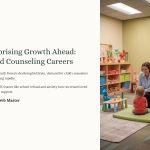 With increasing awareness around mental health and the unique psychological needs of children in modern society, the job outlook for child counselors is showing remarkable promise. Despite South Korea’s declining birthrate, the demand for emotional and behavioral support professionals in schools, clinics, and private sectors is expanding. Particularly post-COVID-19, issues such as school refusal, smartphone dependency, anxiety, and peer conflicts have pushed parents and institutions to seek expert help. The Korean government and education system are also investing more in emotional well-being programs, hinting at a long-term demand spike for certified child counselors.
With increasing awareness around mental health and the unique psychological needs of children in modern society, the job outlook for child counselors is showing remarkable promise. Despite South Korea’s declining birthrate, the demand for emotional and behavioral support professionals in schools, clinics, and private sectors is expanding. Particularly post-COVID-19, issues such as school refusal, smartphone dependency, anxiety, and peer conflicts have pushed parents and institutions to seek expert help. The Korean government and education system are also investing more in emotional well-being programs, hinting at a long-term demand spike for certified child counselors.
As AI and automation replace many jobs, the value of empathetic, human-centered roles is only increasing. With mental health recognized as an essential part of overall well-being, roles such as child counseling are not just secure—they’re vital. Whether you’re a career changer, psychology graduate, or a parent looking to re-enter the workforce with purpose, child counseling offers both financial stability and meaningful contribution to society.

The Expanding Role of Child Counselors in South Korea
Child counselors are no longer limited to clinics or social service centers. Today, they are increasingly employed in schools, online counseling platforms, non-profits, community centers, and even private practice. The Korean Ministry of Education’s growing emphasis on socio-emotional learning (SEL) has created additional school-based roles, while municipal governments are also supporting mental health programs targeting youth. As child mental health becomes a national conversation, institutions are recruiting more certified professionals to fulfill demand.
The emerging trend of tele-counseling services also broadens employment avenues, especially for those seeking work-from-home flexibility. This technological shift has removed geographical constraints, allowing counselors to reach children in remote or underserved areas. As policies evolve to accommodate such models, digital literacy and platform adaptability become valuable assets for future counselors.

Qualifications and Certifications That Matter in the Job Market
Although passion and empathy are fundamental, formal qualifications significantly influence employment prospects. South Korea recognizes several national and private certificates in child counseling, including the Korean Counseling Psychological Association’s certified child counselor license. Private institutions also offer in-depth training programs that specialize in play therapy, art therapy, and trauma-based approaches, which are highly regarded by employers.
Many positions, particularly in public institutions and schools, require candidates to complete a certain number of supervised clinical hours. Therefore, combining academic credentials with hands-on training is essential. The more specialized your skill set—such as handling ADHD, developmental disorders, or trauma—the higher your employability and income potential.

Where the Jobs Are: Emerging Employment Hubs
Urban areas such as Seoul, Busan, and Incheon continue to lead in hiring, thanks to their dense populations and expansive education systems. However, regional governments are increasingly funding mental health initiatives for children in smaller cities and rural towns. These areas offer less competitive but equally rewarding opportunities for new counselors, often with government incentives or housing support.
Another growing field is NGO and non-profit sector engagement, where professionals address broader social issues affecting children, such as abuse, neglect, and poverty. These organizations frequently collaborate with public schools and local welfare offices, adding further employment diversity for certified counselors.

Income Potential and Career Pathways
While entry-level positions may offer modest compensation, experienced counselors, especially those in private practice or managerial roles, can earn competitive salaries. On average, monthly incomes range from ₩2 million to ₩4 million for mid-tier positions, with private session fees reaching ₩50,000 to ₩100,000 per hour. Those who build strong reputations or specialize in niche areas often attract loyal clientele and referrals.
Career growth can also mean transitioning into supervisory, training, or academic roles. Institutions often seek experienced counselors to mentor juniors or lead workshops. Others choose to open their own counseling centers, combining business ownership with service delivery.

Real Challenges You Must Prepare For
Despite its rewards, this field isn’t without challenges. Emotional burnout, irregular working hours, and the need for constant upskilling are common realities. Additionally, while demand is growing, full-time roles with benefits may still be competitive, especially in urban centers. Many start their careers in part-time or contract-based roles, building experience before securing stable positions.
Ethical obligations and confidentiality protocols require a deep understanding of psychological frameworks and legal standards. Thus, ongoing education and supervision are not just recommended—they are necessary to maintain professional standards and avoid malpractice.

Future Outlook: AI-Proof and Emotionally Rich Careers
Unlike many sectors being automated, counseling remains a profoundly human job. Children especially need empathetic, emotionally present professionals who can build trust and help navigate complex emotions. As AI tools support but don’t replace human insight, the child counseling profession is uniquely positioned to remain resilient and even thrive in the age of technology.
Mental child counselor employment outlookhealth is not a passing trend—it’s a cornerstone of a thriving society. Government and private sector investment are aligned in this direction, ensuring that child counseling is not only a safe bet for the future, but a calling with real, lasting impact.
*Capturing unauthorized images is prohibited*





